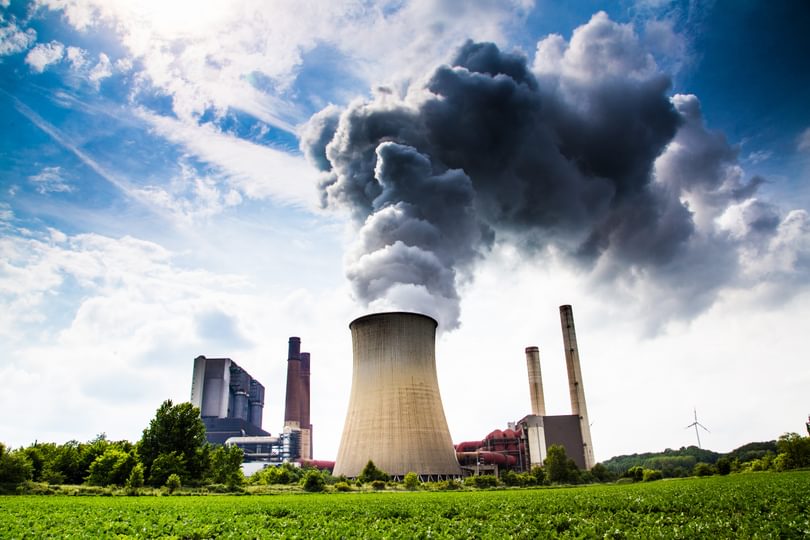
Professor Myles Allen, Co-Director of the Oxford Martin Net Zero Carbon Initiative, gives his views on a new report on carbon capture and storage (CCS), and asks whether this technology could deliver “net zero CO2 fossil fuels”.
The UK government has so many things to worry about right now that combatting climate change appears to have slipped a long way down the priority list. But ensuring that Big Business pays its way and doesn’t get away with dumping costs on long-suffering taxpayers and consumers is at the heart of Theresa May’s agenda. So the report of the Parliamentary Advisory Group on Carbon Capture and Storage (CCS), chaired by Lord Oxburgh, should be at the top of her in-tray this week.
The report recognises that we need a completely new approach to CCS, because relying on subsidies and various forms of carbon pricing clearly isn’t working. Everyone agrees that we need to get net global emissions of carbon dioxide to zero to stabilise climate. There are only two ways to achieve this: a watertight global ban on the extraction and use of fossil fuels, or the deployment of technologies to ensure that, if CO2 is generated by the burning of fossil fuels, it is safely captured at source or re-captured from the atmosphere and disposed of out of harm’s way.
A global ban on fossil fuels is neither affordable nor enforceable, so capture and disposal of CO2 is the only option. Assuming we don’t want to turn the world over to cultivating biofuels and resort to eating insects, then there will always be some uses of fossil fuels for which there is no effective non-fossil substitute, much as environmentalists hate to admit it.
Right now, the only proven large-scale approach to CO2 disposal is geological CCS – the reinjection of CO2 into geological formations underground. There are other ideas out there, but since we have no clear idea what geological CCS will actually cost when it is deployed at scale, whether or not these are needed remains largely hypothetical. And as I have written previously, the IPCC's most ambitious climate change scenario for tackling climate change involves a substantial element of industrial-scale CO2 disposal.
This is the core conclusion of the Oxburgh report: there is no time to lose to find out what CCS actually costs, and the only way we will find that out is by doing it at scale. Britain, with vast off-shore storage potential and a North Sea oil and gas industry literally begging for new opportunities, is uniquely placed to do this – and we have a chance to become world leaders in what will be one of the major growth industries of the 21st century.
The report proposes the establishment of a state-owned CO2-disposal company, to avoid the massive cost escalations resulting from asking private investors to accept all the risks. Crucially, however, they also map out a path to allow the state to withdraw as soon as everything is up and running. This is the recommendation that should chime with the government’s stated agenda of making sure Big Business pays its way.
Within a decade, the Oxburgh report recommends the introduction of a “CCS obligation system”, or more simply a “carbon take-back scheme”, under which companies supplying fossil fuels in the UK would be obliged to prove they have stored (or paid someone else to store) CO2 equivalent to a given percentage of the carbon content of the fuel they have supplied in any particular year.
In principle, this works just like a packaging take-back scheme: we, the consumers, don’t actually want the CO2 emissions that come along with fossil-fuel-based products. One of the most efficient ways of dealing with them is, just like unwanted packaging, to require the companies that sell us those products to take these emissions back.
One day, if we’re going to stabilise climate, they will have to take them all back: that is what net zero means. But for now, it is enough for them to take back a rising percentage so they can demonstrate their CO2 disposal capabilities and avoid any shocks (or “too big to fail” declarations) in the future.
As the Oxburgh report emphasises, such a scheme would also be good for investors in the fossil fuel industry. It would provide them with the security that their money was placed in assets with a long-term future.
The costs of CO2 disposal, just like packaging disposal, would eventually be borne by the consumers of fossil-fuel-based products: but provided the disposed fraction rises progressively, this cost would increase slowly and predictably over decades, allowing consumers and investors to plan and adjust.
One of the puzzles in climate change politics is why the environmental movement is not crying out for a carbon take-back scheme. My personal suspicion is that they have a nagging fear that it might work. The fossil fuel industry has such a formidable track record at driving down the costs of massive engineering projects that they might turn out to be able to deliver “net zero CO2 fossil fuels” that would continue to play a major role in powering the world economy into the 22nd century.
Then again, perhaps they won’t. Perhaps, when the costs of CO2 disposal are included, fossil fuels will remain competitive for only a tiny number of niche applications. There is only one way to find out.
Further reading: Can we hold global temperatures to 1.5C?
This opinion piece reflects the views of the author, and does not necessarily reflect the position of the Oxford Martin School or the University of Oxford. Any errors or omissions are those of the author.
